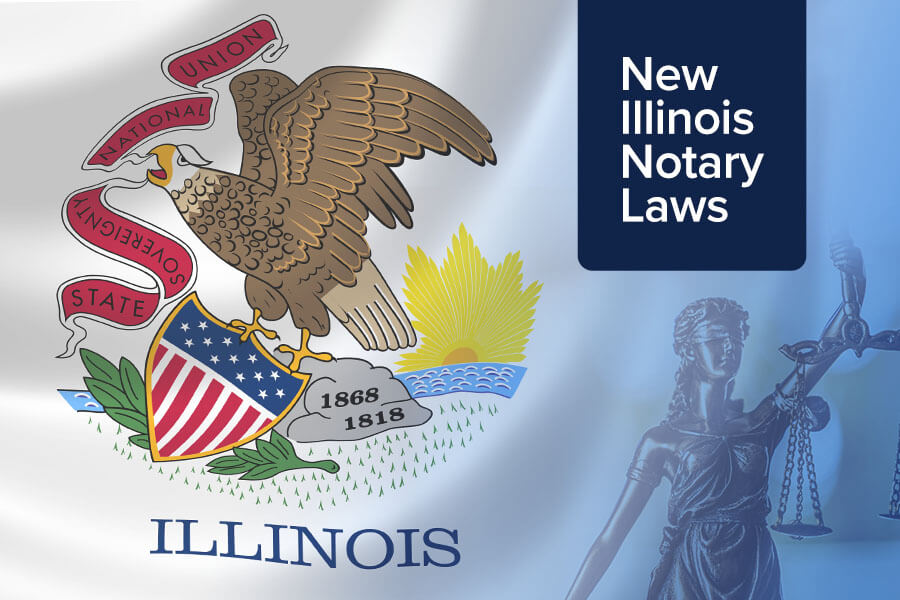
Beginning January 1, 2024, all applicants for an Illinois Notary or Electronic Notary commission will be required to complete a mandatory training course and pass an exam. The course must be offered by a provider that has satisfied the most rigorous training certification standards of any state to date. Here’s what you need to know about the new training and examination requirements.
Overview of the Illinois Notary course and exam rules
2021 Senate Bill 2664 authorized the Illinois Secretary of State to require Notary Public and Electronic Notary Public commission applicants to take a course of study and pass an examination on notarization and electronic notarization. Earlier this year, the Secretary adopted administrative rules requiring applicants to take a course and pass an exam. The rules also spelled out the requirements for the course and exam and certification of course providers.
Individuals applying for a new or renewed Notary and Electronic Notary commission on or after January 1, 2024, must take a 3-hour course and pass a test. The course may be taken in-person in a classroom or online. The online course can be synchronous (student and instructor are engaged online at the same time) or asynchronous (learner takes a course on demand). The course must be taught by a provider or instructor certified by the Secretary.
Course providers administer the examination at the conclusion of the course. The final exam consists of 50 true/false or multiple-choice questions, or a combination of both. A passing grade is 85%. The exam may be taken 3 times before the student is deemed to have failed the course. While a student is not required to repeat the course after a failing score, they may review the course before retaking each successive exam.
Upon passing the examination, applicants have 2 years from the date of the exam to apply for a commission.
Rigorous requirements for providers of the course and exam
The administrative rules for provider certification prescribe rigorous regulations for the course and examination. Following are some of these rules:
- Providers must have a procedure for verifying the identity of the student before the course and, if the course is taken online, for the duration of the course. Online course providers must use web video proctoring, screen monitoring, dynamic knowledge-based authentication questions asked at specified intervals, or any method or combination of methods of identity verification that reasonably establishes the identity of the student and the student’s presence during the course.
- Providers must verify student participation during the course by incorporating a built-in timer that ensures students complete 180 minutes of instructional time and prevents the student from advancing through the course without reading the material.
- At least 1 course validation question must be asked after each multimedia clip that exceeds 1 minute.
- Providers must create a bank of 100 examination questions for the final exam.
Course providers also must satisfy stringent requirements to be certified by the Secretary of State. A provider must obtain a $50,000 surety bond for the protection of students’ contractual rights. Contracts between providers and students must comply with the specific requirements outlined in the administrative rules. The provider must provide a toll-free customer service hotline that is answered at a minimum between 9:00 a.m. and 5:00 p.m. Central Time, Monday through Friday. A provider must supply the Secretary of State with a detailed description of each position involved in every facet of the course and examination and provide staffing changes to the Secretary within 5 business days.
There are also strict rules for the protection of students’ consumer information. Providers must prevent unauthorized access to consumer information. Providers are prohibited from disclosing or selling any consumer information or requesting Social Security numbers of students except for the purpose of utilizing a third party to provide dynamic knowledge-based authentication questions during the course.
Commenting on these rigorous provider requirements, Steven Bastian, NNA Vice President of Product Management said, “The Illinois course provider certification requirements are like none other in any state that requires mandatory Notary education.”
Bastian noted the NNA was the first provider approved by the Secretary of State this Fall. “A student who takes the NNA’s Illinois mandatory education course,” Bastian added, “can be assured that the NNA has complied with all certification requirements and that our course satisfies all the requirements of the Illinois rules as well.”
The NNA’s Illinois mandatory education course is available now at https://www.nationalnotary.org/illinois-state-required-notary-training-and-exam.
Bill Anderson is Vice President of Government Affairs for the National Notary Association